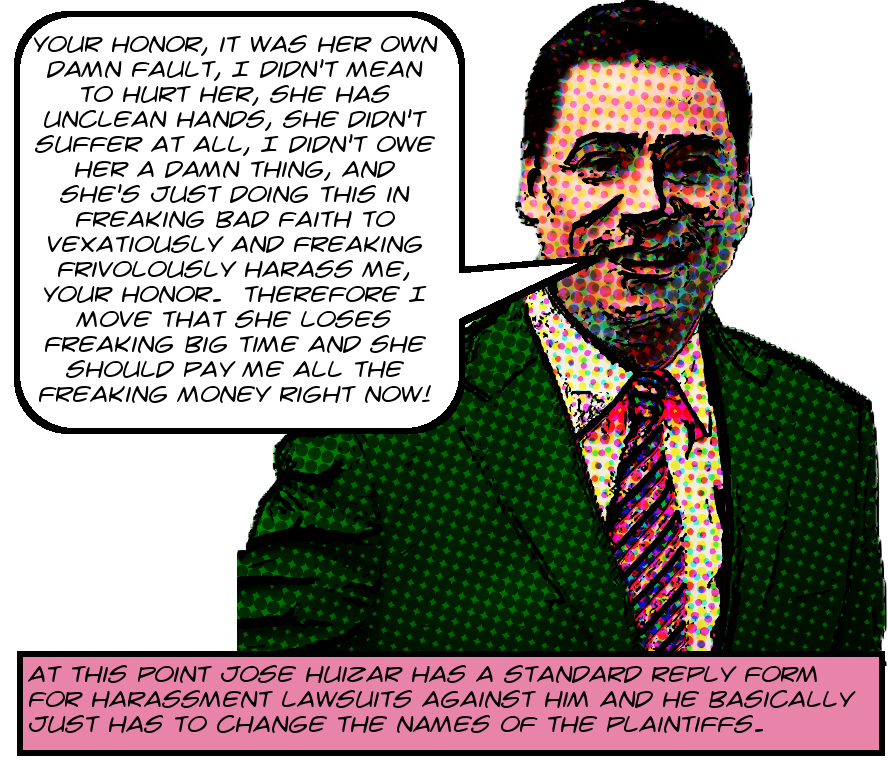 Unaccountably-not-yet-resigned City Councilmember José Huizar has two lawsuits pending against him, filed by former employees. Both of them most plausibly allege at least 31 flavors of harassment, outlawry, and workplace insanity against him. One was filed by Mayra Alvarez, his former scheduler, and you can read about it here. The other, filed a week later by Pauline Medina, is discussed here.
Unaccountably-not-yet-resigned City Councilmember José Huizar has two lawsuits pending against him, filed by former employees. Both of them most plausibly allege at least 31 flavors of harassment, outlawry, and workplace insanity against him. One was filed by Mayra Alvarez, his former scheduler, and you can read about it here. The other, filed a week later by Pauline Medina, is discussed here.
And last week Huizar filed his response to Medina’s complaint, and I got a copy of it yesterday (and added it to my growing collection of pleadings here on Archive.Org). And it’s not that interesting. These first answers to complaints rarely are. It’s basically just a list of reasons why Huizar denies everything. In fact, the most interesting thing about it is that it’s essentially cribbed from his answer to Alvarez, filed the week before it. I suppose if he’s going to make a habit of inducing these kind of lawsuits, he might as well save money by developing a generic response form.
But that wasn’t the only thing filed last week. Huizar also filed this peremptory challenge to Judge Barbara Meiers. The California Code of Civil Procedure at §170.6(a) allows any litigant to file such a challenge to one judge per case by affirming that the judge is biased against the party. It’s not required to present evidence for this.
I’m not sure what it is that Huizar has against Meier, and there’s not much on the Internet that tends to enlighten. Meier’s reviews on the Robing Room are pretty uniformly abysmal, but that’s true for most judges, it seems, so we’re probably never going to know the facts. Turn the page to read the actual code section!
Transcription of the pertinent parts of CCP §170.6:
170.6.
(a) (1) A judge, court commissioner, or referee of a superior court of the State of California shall not try a civil or criminal action or special proceeding of any kind or character nor hear any matter therein that involves a contested issue of law or fact when it is established as provided in this section that the judge or court commissioner is prejudiced against a party or attorney or the interest of a party or attorney appearing in the action or proceeding.
(2) A party to, or an attorney appearing in, an action or proceeding may establish this prejudice by an oral or written motion without prior notice supported by affidavit or declaration under penalty of perjury, or an oral statement under oath, that the judge, court commissioner, or referee before whom the action or proceeding is pending, or to whom it is assigned, is prejudiced against a party or attorney, or the interest of the party or attorney, so that the party or attorney cannot, or believes that he or she cannot, have a fair and impartial trial or hearing before the judge, court commissioner, or referee.
…
(4) If the motion is duly presented, and the affidavit or declaration under penalty of perjury is duly filed or an oral statement under oath is duly made, thereupon and without any further act or proof, the judge supervising the master calendar, if any, shall assign some other judge, court commissioner, or referee to try the cause or hear the matter. … Except as provided in this section, no party or attorney shall be permitted to make more than one such motion in any one action or special proceeding pursuant to this section. In actions or special proceedings where there may be more than one plaintiff or similar party or more than one defendant or similar party appearing in the action or special proceeding, only one motion for each side may be made in any one action or special proceeding.
Image of José Huizar is ©2018 MichaelKohlhaas.Org and is you know kindsa likesies this Huizar here.
